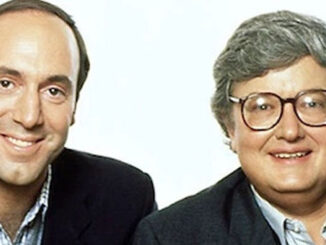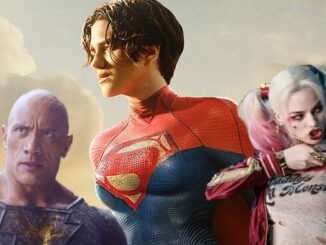In a multi-part series, Comic Book Film Editor William Gatevackes will be tracing the history of comic book movies from the earliest days of the film serials to today’s big blockbusters and beyond. Along with the history lesson, Bill will be covering some of the most prominent comic book films over the years and why they were so special. This time, we’ll talk about Harvey and Archie Comics and what took them so long to reach the big screen.

If you are of a certain age, then Harvey and Archie Comics played an important part of your childhood. Growing up in the 1970s, I seem to recall that the offerings from those two companies took up as much rack space at the local newsstand as the offerings of Marvel and/or DC. And, as a child, more often than not, I’d be drawn to the bright colors, cartoonish characters, and goofy storylines and pick up an issue of Richie Rich Millions or Little Archie over Batman or Amazing Spider-Man.
If comic books turned from a pastime to a hobby for you as you grew up these companies could very well have become an albatross around your neck. More than one well-meaning adult would buy you a copy of Archie, thinking that since it was a comic book, you’d love it. Only you were at an age where you grew out of those kinds of books and viewed them as childish.
Then, most likely, as an adult, you come to look back at those books with a sense of nostalgia, remembering the sheer joy you had reading those issues on the living room floor.
This experience might not be all that different amongst many people of a certain age. Harvey and Archie have become a part of Americana, part of our cultural heritage. Both publishers have become a vital part of American comic book history, although it would take decades for each of them to have properties adapted for the big screen. And when films were finally made of these companies comics, one company was out of business and the other’s film featured a tertiary character getting their shot at stardom, not the most well known character.
 Harvey Comics dates all the way back to the Golden Age of Comics, where they were one of the earliest comic book publishers. Back then, like most comic companies, their output was primarily superheroes—characters such as Shock Gibson, Captain Freedom and Black Cat.
Harvey Comics dates all the way back to the Golden Age of Comics, where they were one of the earliest comic book publishers. Back then, like most comic companies, their output was primarily superheroes—characters such as Shock Gibson, Captain Freedom and Black Cat.
In 1950, when superheroes were on their way out, Harvey entered into an agreement with Paramount Pictures to do comic books based on some of their more famous cartoons—Casper the Friendly Ghost, Baby Huey, and Little Audrey. The success of these brands turned Harvey into a publisher that specialized in kid-friendly comics. Eventually, they would supplement these licensed properties with characters of their own creation such as Wendy the Good Witch, Hot Stuff and Richie Rich.
 Richie Rich was created in 1953 in the pages of Little Dot by Alfred Harvey and Warren Kremer. He was dubbed “the poor little rich boy” and while he had enough money to buy two of whatever he wanted, he was always nice and kind to anyone he met. His adventures typically dealt with people trying to steal his fortune or tricks played on him by his cousin Reggie Van Dough, Jr.
Richie Rich was created in 1953 in the pages of Little Dot by Alfred Harvey and Warren Kremer. He was dubbed “the poor little rich boy” and while he had enough money to buy two of whatever he wanted, he was always nice and kind to anyone he met. His adventures typically dealt with people trying to steal his fortune or tricks played on him by his cousin Reggie Van Dough, Jr.
Richie Rich became Harvey’s most popular character, starring in over 50 different titles from the company over the next three decades. As popular as he was, he wouldn’t get a film until after Harvey went out of business.
Harvey went into a decline during the early 1980s and went out of business in 1982. The company came back briefly from 1986 to 1989 before the family sold the rights to HMH Communications, which published some of the Harvey titles until 1994, when regular publication stopped. That was the same year that Richie Rich arrived in theaters.
 Richie Rich starred Macaulay Culkin in the title role. This was just at the end of Culkin’s career as a child actor, as he would go on a six year hiatus from films after this one. The plot follows the typical comic book plot of an outsider trying to steal the Rich fortune (in this case Laurence Van Dough) and Richie being the only one to try and stop him. Only, the film did it with a whole lot of attempted murder. The film was a disappointment at the box office yet a resounding success on the home video market. It did well enough that it garnered a direct-to-video sequel, Richie Rich’s Christmas Wish in 1998. None of the stars of the original returned, with David Gallagher replacing Culkin in the lead.
Richie Rich starred Macaulay Culkin in the title role. This was just at the end of Culkin’s career as a child actor, as he would go on a six year hiatus from films after this one. The plot follows the typical comic book plot of an outsider trying to steal the Rich fortune (in this case Laurence Van Dough) and Richie being the only one to try and stop him. Only, the film did it with a whole lot of attempted murder. The film was a disappointment at the box office yet a resounding success on the home video market. It did well enough that it garnered a direct-to-video sequel, Richie Rich’s Christmas Wish in 1998. None of the stars of the original returned, with David Gallagher replacing Culkin in the lead.
Archie Comics also traces its history back to the Golden Age, but it’s most famous character is almost as old as the company that also bears his name. MLJ Magazines, as Archie Comics was known then, started operations in 1939. The company would publish the typical superhero and action tales until 1941 when America’s favorite red-headed teenager was created.
 Archie Andrews first appeared in Pep Comics #22 in December of 1941, created by Vic Bloom and Bob Montana. It is told that Mickey Rooney’s Andy Hardy was the inspiration for Archie, but whatever the inspiration, the character became immediately popular and influential. For the next thirty years, almost every comic book company came up with their own teen character to try to capitalize on Archie’s popularity. None could quite match up to the original.
Archie Andrews first appeared in Pep Comics #22 in December of 1941, created by Vic Bloom and Bob Montana. It is told that Mickey Rooney’s Andy Hardy was the inspiration for Archie, but whatever the inspiration, the character became immediately popular and influential. For the next thirty years, almost every comic book company came up with their own teen character to try to capitalize on Archie’s popularity. None could quite match up to the original.
Although Archie and the gang have appeared in TV movies and cartoons, they have yet to make it to the cineplexes. But some of their supporting characters, Josie and the Pussycats, did in 2001.
 Josie and the Pussycats were created by cartoonist Dan DeCarlo and Josie first appeared as a back-up strip in Archie’s Pals ‘n’ Gals #23 in 1963. Six years later, in accordance to a Hanna-Barbara cartoon that portrayed Josie and her friends as a rock band, the comic book Josie started her own band, Josie and the Pussycats. The rest, they say, is history.
Josie and the Pussycats were created by cartoonist Dan DeCarlo and Josie first appeared as a back-up strip in Archie’s Pals ‘n’ Gals #23 in 1963. Six years later, in accordance to a Hanna-Barbara cartoon that portrayed Josie and her friends as a rock band, the comic book Josie started her own band, Josie and the Pussycats. The rest, they say, is history.
The film version of the strip contains a satire about the then current, highly marketed pop band format wrapped around your typical “friends who are in a band get success, success is focused on one member of the band, and the friendship is threatened” plots. The film was aimed at a slightly older audience than Archie Comics’ typical kid demographic, as it was rated PG-13 for language and sensuality. The film was a box office and critical failure.
Next time, we’ll cover the American film adaptations of two popular British comic book heroes. Spoiler: it’s not pretty.





HISTORY OF THE COMIC BOOK FILM: Hey, Kids Comics! http://t.co/LbIjuMW7